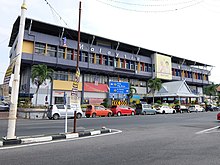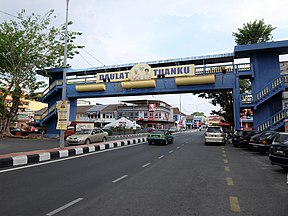Kangar
Kangar
Kangaq | |
|---|---|
Hanyu Pinyin) | |
| • Hokkien | 加央 / Ka-yang (Tâi-lô) |
| • Tamil | கங்கார் Kaṅkār (Transliteration) |
From top, left to right: , KPJ Perlis Specialist Hospital and the PKENPS Tower @ K-PARCDowntown Kangar, Alwi Mosque, Merdeka Square, Perlis State Legislative Assembly | |
|
MST) | |
| • Summer (DST) | Not observed |
| Website | mpkangar |
Kangar Municipal Council Majlis Perbandaran Kangar مجليس ڤربندرن كڠار | |
|---|---|
Local authority | |
| History | |
| Founded | 1 January 1980 |
| Leadership | |
President | Norazlan Bin Yahaya |
Municipal Secretary | Raziff Yaacob |
| Meeting place | |
 | |
| 192, Persiaran Jubli Emas, 01000 Kangar, Perlis. | |
| Website | |
| mpkangar | |
Kangar (Northern Malay: Kangaq; Jawi: كڠار) is the state capital and the largest town in Perlis, Malaysia.[1] It has a population of 48,898 and an area of 2,619.4 ha. It is located next to the Thailand border, in the northernmost point of Peninsular Malaysia. It is situated by the Perlis River.[2]
The town is also a gathering centre for the paddy rice production of the surrounding district. Its municipal government is unified with that of the neighbouring communities of Arau and Kaki Bukit. The centre of Kangar is Sena Province. The town is the smallest state capital in Malaysia and its inhabitants are mostly farmers and civil servants. Its industries include cement, saw milling, rubber, paper, and processing of sugar and prawns.[3]
History

Kangar existed from about 350 years ago, that is since 1653 when Kota Sena was built as the administrative centre for the 14th Sultan of Kedah, Sultan Muhyiddin Mansor Shah. Kangar was then a land port or pengkalan where boats and tongkangs anchor at the confluence of Perlis River, which runs through Kangar town to Kuala Perlis.[1]
The name Kangar was derived from a type of tree. It was here at the port that trading was done, under a big tree that gave shade and respite to the traders. This tree that became a "witness" to many business deals was called Pohon Kangar. Every trader and merchant who came and went to this place began calling it the Pohon Kangar Port, in honour of the tree.[1]
Demographics
Majority of Kangar population speaks Perlis Malay which is a sub-dialect of Kedah Malay but also has its own unique features compared to those of neighbouring Kedah.
The
Other languages spoken in Kangar includes
Places of interest

Downtown Kangar is a mixture of old and new shophouses, and has an elegant colonial State Secretariat Building and clocktower from the 1930s. Other major landmarks are:
- PKENPS Tower @ K-PARC Kangar, the tallest building in Perlis
- Dato' Wan Ahmad's House
- Kubu Hill Recreational Park
- Malay World Weaponry Museum
- Medan Mountain
- Perlis Craft Cultural Complex
- State Museum and Heritage Hall
- Alwi Mosque, the former state mosque built in 1910
- Tuanku Syed Putra Stadium
- Gua Kelam, a cave in Kaki Bukit
- Snake Farm of Sungai Batu Pahat
- Bukit Ayer Recreational Park
- Wang Kelian - Next to Thai border
- Padang Besar Shopping Arcade - Duty Free Zone
- Royal Palace of Arau
- Fish Grill Food Court, Kuala Perlis
- Mini Putrajaya - State Assembly Building
- Gua Cenderawasih Park - Look out point
- Perlis State Library (Malay: Perpustakaan Negeri Perlis), main public library of the State of Perlis and the headquarters of the Perlis Public Library Corporation (Malay: Perbadanan Perpustakaan Awam Perlis, abbreviated as PPANP).[5]
Notable natives
References
- ^ a b c "Kangar Background | Kangar Municipal Council". Majlis Perbandaran Kangar. Retrieved 23 December 2020.
- ^ Information, Malaya Department of (1957). Fact Sheets on the Federation of Malaya. The Department.
- ^ "Kangar | Malaysia". Encyclopedia Britannica. Retrieved 23 December 2020.
- ^ "Population Distribution and Demography" (PDF). Malaysian Department of Statistics. Archived from the original (PDF) on 13 November 2013.
- ^ "Perlis Public Library Corporation Website".
External links
6°26′N 100°12′E / 6.433°N 100.200°E





